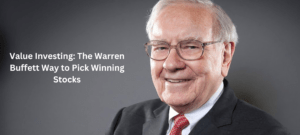Introduction
Warren Buffett, known as the Oracle of Omaha, is one of the most successful investors of our time. With a net worth in the billions, Buffett has built an investment empire through his company Berkshire Hathaway. His investment strategies and philosophy have garnered admiration and respect from both novice and seasoned investors around the world. In this blog post, we will delve into the investment wisdom of Warren Buffett and explore the valuable lessons we can learn from his remarkable success.
The Power of Long-Term Thinking :
Warren Buffett’s investment approach revolves around long-term thinking. He believes in investing in companies with solid fundamentals, enduring competitive advantages, and excellent management. Buffett emphasises the importance of understanding the underlying value of a business and staying invested for the long haul. This section will delve into the benefits of adopting a long-term perspective and how it can generate substantial wealth over time.
Value Investing:
The Buffett Way :Buffett’s investment strategy is rooted in value investing. He looks for undervalued companies trading below their intrinsic worth and buys them at a discount. This section will explore the principles of value investing, including analysing a company’s financials, assessing its competitive position, and identifying potential catalysts for growth. We will also discuss Buffett’s famous quote: “Price is what you pay; value is what you get.”
Moats:
Building Strong Barriers :Buffett often speaks about the importance of economic moats. He seeks companies with sustainable competitive advantages that can protect their market share and generate consistent profits. This section will examine the various types of moats, such as brand loyalty, patents, network effects, and economies of scale. We will delve into Buffett’s focus on investing in businesses with wide and durable moats that can withstand competition.
The Importance of a Margin of Safety:
Buffett places a strong emphasis on the concept of a margin of safety. He believes that investors should buy stocks when they are trading at a significant discount to their intrinsic value, providing a buffer against potential downside risks. This section will discuss how to calculate a margin of safety and its significance in mitigating investment risks.
The Art of Patience:
Patience is a virtue in investing, according to Buffett. He advocates for holding investments for the long term and not being swayed by short-term market fluctuations. This section will delve into the importance of patience, resisting the urge to time the market, and allowing investments to compound over time. We will discuss Buffett’s famous quote: “The stock market is a device for transferring money from the impatient to the patient.”
Embracing Contrarian Thinking:
Buffett has often gone against the crowd and embraced contrarian thinking. He looks for opportunities in sectors or companies that are temporarily out of favour with the market. This section will explore the benefits of contrarian investing, including the potential for higher returns and reduced competition.We will also discuss Buffett’s ability to detach himself from market sentiment and make rational investment decisions.
The Virtue of Simplicity:
Buffett’s investment philosophy is famously simple. He avoids complex financial instruments and seeks to understand businesses that he can explain to a ten-year-old. This section will explore the value of simplicity in investing, including the importance of clarity, transparency, and avoiding unnecessary complexity.
The Importance of Continuous Learning:
Warren Buffett is a voracious reader and believes in the power of continuous learning. This section will explore Buffett’s reading habits, his recommended books for investors, and the benefits of expanding one’s knowledge base. We will discuss how continuous learning can provide valuable insights, enhance investment decision-making, and keep investors ahead of the curve.
The Significance of Emotional Control:
Buffett is known for his calm and rational approach to investing. He emphasises the importance of emotional control and avoiding impulsive decisions based on fear or greed. This section will delve into the psychological aspects of investing, including the impact of emotions on decision-making and strategies to cultivate emotional control. We will discuss how Buffett’s disciplined mindset has helped him navigate market volatility and make sound investment choices.
The Power of Compounding:
Buffett has often spoken about the power of compounding returns over time. This section will explore the concept of compounding and how it can exponentially grow wealth. We will discuss Buffett’s famous quote: “My wealth has come from a combination of living in America, some lucky genes, and compound interest.” We will also provide practical examples and strategies for harnessing the power of compounding in our own investment portfolios.
Philanthropy and Giving Back:
Beyond his investment success, Warren Buffett is admired for his philanthropic efforts. This section will highlight Buffett’s commitment to giving back and his famous pledge to donate the majority of his wealth to charitable causes. We will discuss the importance of philanthropy in creating a positive impact on society and how investors can incorporate charitable giving into their own financial plans.
Avoiding Market Timing:
Buffett has long advised against trying to time the market. He believes that it is impossible to consistently predict short-term market movements and that long-term investment success is not dependent on market timing. This section will discuss the pitfalls of market timing, the importance of staying invested, and how to maintain a disciplined investment approach regardless of market conditions.
Building a Diversified Portfolio:
Buffett stresses the importance of diversification to manage investment risk. This section will explore the concept of diversification, including asset allocation, sector diversification, and the benefits of spreading investments across different asset classes. We will discuss how Buffett has achieved diversification through his holdings in Berkshire Hathaway and provide practical tips for building a well-diversified investment portfolio.
The Role of Ethics and Integrity in Investing:
Buffett places a strong emphasis on ethical behaviour and integrity in business. This section will explore the significance of ethics in investing, including the importance of investing in companies with strong corporate governance and ethical practices. We will discuss how Buffett’s commitment to ethical investing has not only contributed to his success but also earned him the trust and respect of investors worldwide.
Conclusion:
Warren Buffett’s investment wisdom encompasses a wide range of principles and strategies that can guide investors on their journey to financial success. From continuous learning and emotional control to the power of compounding and philanthropy, Buffett’s lessons extend beyond pure investment strategies. By embracing these principles and incorporating them into our own investment approaches, we can strive to become more knowledgeable, disciplined, and ethical investors, just like the Oracle of Omaha himself.




